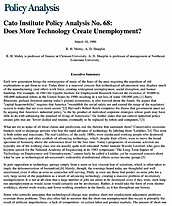Each new generation brings the reemergence of many of the fears of the past, requiring the repetition of old explanations to put them to rest. Today there is a renewed concern that technological advancement may displace much of the manufacturing (and other) work force, creating widespread unemployment, social disruption, and human hardship. For example, in 1983 the Upjohn Institute for Employment Research forecast the existence of 50,000 to 100,000 industrial robots in the United States by 1990, resulting in a net loss of some 100,000 jobs.[1] Barry Bluestone, perhaps foremost among today’s gloomy economists, is also worried about the future. He argues that “capital hypermobility” requires that America “reestablish the social safety net and extend the range of the regulatory system to make that net even more secure.”[2] Harvard’s Robert Reich completes the theme that government must act by arguing that America’s industrial policy “is the by-product of individual corporate strategies whose goals may have little to do with enhancing the standard of living of Americans.” He further states that our current industrial policy creates jobs that are “lower-skilled and routine, eventually to be replaced by robots and computers.”[3]
What are we to make of all these claims and predictions and the rhetoric that surrounds them? Conservative economic thinkers tend to disparage persons who fear the rapid advance of technology by labeling them “Luddites.”[4] This term is both unfair and inaccurate. The real Luddites, of the early 1800s, were uneducated working people who destroyed textile machinery and other symbols of advancing technology, which, despite their efforts, were to move the broad spectrum of humanity above the subsistence level for the first time. Today’s proponents of economic activism are typically not of the working class and are usually quite well educated. Nobel laureate Wassily Leontief, who gave the keynote speech for the National Academy of Engineering at its 1983 symposium “The Long-Term Impact of Technology on Employment and Unemployment,” cannot fairly be called a Luddite, yet he expressed concern about what he saw as technological advancement’s undesirable distributional effects across income groups.[5]
In part, opposition to technology springs simply from a more or less visceral fear of scientism, which is often taken to imply the dehumanization of humankind.[6] Mainly, though, the warnings heard today are thoughtful and well intentioned, even if often in error or somewhat self-serving. Flatly in error are those that predict no more jobs for a very large sector of the population as a result of advancing technology, creating a massive problem of involuntary unemployment. It is not at all clear that a large number of jobs are about to be destroyed; even if they were, such long-run unemployment as would occur would certainly not be involuntary. Rather, it would take the form of even shorter workdays, shorter work-weeks, and fewer working members in the family, as it has throughout our history.
Some who correctly anticipate that technological change may produce short-run employment-adjustment problems overstate those problems. They also often fail to mention that the short-run unemployment that occurs is primarily the result of artificial imperfections–a lack of competition–in certain labor and product markets. The amount of short-run unemployment created by advancing technology, as well as the amount of howling (or lobbying), is directly related to the degree of artificiality in the particular labor markets affected. It will be argued below that the workers harmed by technological advancement are those who have been receiving wages in excess of the amount they would receive in a fully competitive labor market. In other words, they have been receiving economic rent. It will be further argued that those workers remain unemployed when displaced by technology because they seek to regain their former employment or seek employment in another industry that pays excessive wages. In other words, they are unemployed because they are rent seekers. Finally, the effects of slow and rapid technological change will be discussed. The rate of change can serve as a basis for reasoned debate of some of the legitimate social concerns facing our society as a result of technological advancement, given the institutional imperfections already existing in the labor market.
About the Authors

This work is licensed under a Creative Commons Attribution-NonCommercial-ShareAlike 4.0 International License.
